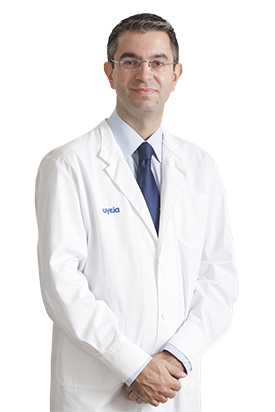It is written by
Grigorios Pattakos
heart surgeon,
Director of the Second Cardiac Surgery Clinic HEALTH &
Asst. Director of the Percutaneous Valves Department HYGEIA
It is known that if someone suddenly feels a sharp pain in the chest, they may be having a myocardial infarction and will rush to a hospital. But there are several heart conditions that give us no warning and no symptoms to know that there is a problem. There are also atypical symptoms such as pain in the jaw or upper extremity that we may not immediately think of as heart related. People who appear healthy may experience a threat to their lives without any prior indication. For these cases, screening is vital. Here we will discuss some categories of heart disease and the reasons why they may need treatment before we even know we have the disease.
Coronary artery disease
The coronary vessels supply the heart muscle with oxygenated blood. When there is a thrombosis and it closes an artery, then a part of the heart becomes necrotic (myocardial infarction) and the function of the heart decreases. Usually the narrowing of the coronary vessels gives symptoms of chest pain when the person exercises (angina). In several cases the pain may be atypical and the patient may describe feeling “heaviness”, “pressure”, or simple discomfort. Also, the pain can be in unpredictable parts of the body such as the jaw and the upper limb. An increased likelihood of no symptoms or symptoms being atypical is seen in diabetic patients and in women. People with a family history of coronary artery disease should also pay increased attention to any discomfort. There are multiple tests that can diagnose coronary heart disease before it gives symptoms (cardiogram, cardiac triplex, stress test, CT or invasive coronary angiography, blood tests) and each patient’s cardiologist will choose the appropriate test for each case.

Stenosis or insufficiency of heart valves
Heart valves control the flow of blood within the heart. These valves can become narrowed making it difficult for blood to pass through them. Also, they can relax and fail, allowing blood to turn in the wrong direction, making it difficult for the heart to work. The most common symptom of advanced valvular disease is shortness of breath, but the patient may also experience fluttering or generalized weakness. These symptoms come from the overload of blood within the heart and the generalized damage the heart has suffered. New studies show much better outcomes in patients who have surgery before they feel symptoms because damage associated with symptoms is avoided. Thus, the disease is treated before the heart is irreparably damaged. The most common and easy way to check our heart valves is the heart triplex which will inform us about the function of the heart valves but also about the general structure of the heart and about possible consequences of any valvular disease.
Heart tumors
Heart tumors are often non-cancerous findings that, however, carry the risk of several complications. These tumors can block the flow of blood inside the heart, cause arrhythmias or even a small part of them can embolize, creating a stroke in the patient. In many cases these tumors are incidental findings in an examination done for another reason because the patient is asymptomatic until one of their dangerous complications occurs. Myxomas, which are usually found in the atria of the heart, and fibroelastomas, which are usually on the surface of the aortic valve, are the most common benign tumors of the heart. Treatment consists of surgical excision before the patient experiences any complications.


Conclusion
Many of the heart conditions that require treatment do not produce symptoms until the heart has suffered some damage or the patient has some dangerous complication. To prevent such problems, regular cardiac check-ups are important, even if there are no symptoms.
